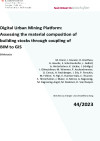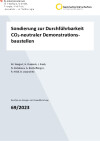Suchergebnisse für "Factsheet: Energietechnologien gestalten, die für alle sinnvoll und nutzbar sind"
digiaktiv - digitale Transformation für größere Interaktivität in der Technische Gebäudeausrüstung-Planung
Das Projekt digiaktiv verfolgt eine Verbesserung der Interoperabilität zwischen den unterschiedlichen Baugewerbegewerken durch neutrale, offene semantische Datenmodelle zu ermöglichen. Dabei trägt digiaktiv mittels digitaler Transformationsprozesse zur Steigerung der Planungsqualität und dem Betrieb von Bauwerken, sowie zur Minimierung des Schnittstellenrisikos bei.
Digital Urban Mining Platform: Assessing the material composition of building stocks through coupling of BIM to GIS (BIMstocks)

Hauptziel von BIMstocks ist die Entwicklung einer Methodik für die digitale Erfassung der materiellen Zusammensetzung des Baubestandes für die Modellierung einer digitalen Urban Mining Plattform sowie Prädiktion der Recyclingpotentiale.
Schriftenreihe
44/2023
M. Honic, I. Kovacic, D. Breitfuss, G. Gourlis, S. Schützenhofer, J. Gallistl, A. Hinterleitner, K. Löcker, I. Schlögel, I. Gilmutdinov, M. Wimmer, P. Aschenbrenner, O. Cencic, H. Rechberger, I. Erb, P. Ferschin, M. Fellner, H. Figl, V. Huemer-Kals, C. Thurner, S. Hinterholzer, J. Maier, U. Moroz, A. Ragossnig, M. Ragossnig-Angst, M. Raskovic, D. Van Rooyen
Herausgeber: BMK
Deutsch, 57 Seiten
Downloads zur Publikation
BIMSavesEnergy - BIM-basierte Planungsmethoden zur Sicherstellung von Energie-effizienz im Bauprozess
Das Building Information Model (BIM) bewirkt grundlegende Veränderungen in Planung und Bau von Gebäuden, da durch die gemeinsame Datenbasis erstmals eine enge, organisationsübergreifende Zusammenarbeit in Bauprojekten möglich wird. In diesem Projekt wurden BIM-basierte Planungsmethoden entwickelt, die den Einfluss von Planungsentscheidungen auf die Energieeffizienz quantitativ bewertbar und im Managementprozess steuerbar machen.
CO2-Demobau - Sondierung zur Durchführbarkeit CO2-neutraler Demonstrationsbaustellen

Durch Aufzeigen von grünen Innovationen, Vernetzung mit Stakeholdern der Baubranche und Anwendung der Erkenntnisse der Vorstudie "CO2 neutrale Baustelle" wird das Fundament für zukünftige CO2-neutrale Demonstrationsbaustellen gelegt. Diese Baustellen dienen als Best-Practice-Beispiele für die Bereiche Vergabe, Baubetriebsorganisation und -technologie.
Schriftenreihe
69/2023
M. Weigert, H. Daxbeck, J. Raab, N. Kisliakova, A. Bischofberger, R. Hölzl, B. Lepuschitz
Herausgeber: BMK
Deutsch, 100 Seiten
Downloads zur Publikation
Digitaler Zwilling / Building Tracker - Kopplung der Gebäudesimulation mit physischen Gebäuden in Echtzeit
Ziel des Projektes ist die Kopplung eines Bürogebäudes in der Betriebsphase mit seinem virtuellen Zwilling, dem "Building-Tracker", der im Projekt entwickelt und erstmalig eingesetzt wird. Mit Hilfe der Kopplung von Monitoring und Simulation ist ein innovatives Gebäudeenergiemanagement zur Erreichung von nahe Nullenergiegebäuden möglich.
AFOM - Automatisierte Fehler- & Optimierungsanalyse durch Messdatenerfassung
Im Projekt sollen Methoden entwickelt werden, um aus den Messwertverläufen Informationen über den Betrieb sowie Betriebsveränderungen zu erkennen und einer Fehlerbehandlung zuführen zu können. Durch die Einbindung von BIM-Daten aus dem Gebäude sollen entsprechende Modelle zur Validierung der Heizung, Lüftung, Klima (HLK)-Netzwerke erzeugt werden, welche zur Analyse herangezogen werden.
openBAM - Open Building Automation Modelling - Offene Modellierung der Gebäudeautomation über den gesamten Gebäudelebenszyklus
Plattform-unabhängige Modellierung der Steuerungs- und Regelungslogik zur detaillierten Untersuchung von Gebäudeautomationssystemen mit Bautechnik und Gebäudetechnik. Das Ergebnis ermöglicht es, Energieeinsparungspotenziale durch Gebäudeautomation schon vor der Ausführung digital zu analysieren.
BIM2BEM Flow - Kontinuierliche, BIM-basierte Energieeffizienzplanung
Durch eine automatisierte Integrierung und Zuweisung der Austauschanforderungen zwischen Entwurfs- und Simulationsprogramm anhand der ausgearbeiteten Austauschinformationsanforderungen, soll eine kontinuierliche Energieeffizienzplanung entlang der Entwurfsphase ermöglicht werden.
BIMstocks - Digital Urban Mining Platform: Assessing the material composition of building stocks through coupling of BIM to GIS
The main goal of BIMstocks is the development of a method for the digital capturing of the material composition of the existing building stock for follow up modelling of an Urban Mining Platform as well as for the prediction of the recycling potentials.
BIMpeco - Environmentally relevant product data in collaborative BIM environments
Construction products can pose a risk to the environment and health due to their pollutant content or releases. In the BIMpeco project, workflows and data structures for digital information management of this environmentally relevant product data are developed. For this purpose, the new ISO standards ISO 23387 and ISO 19650-1 are tested and synchronized with established process flows. The project results will be made available on an open-source basis and can be integrated into any Common Data Environment (CDE) that complies with the standards mentioned. The BIMpeco project is the first to lay the foundations for product information management of environmentally relevant properties in the CDE, covering the entire lifecycle and supply chain.
BIM2BEM Flow - Continuous BIM-based energy efficient planning
Automated integration and assignment of exchange requirements between the design and simulation programs, based on the elaborated exchange information requirements, should enable continuous energy efficiency planning along the design phase.
digiactiv - digital transformation for more interactivity in MEP-(mechanical, electrical and plumbing-)planning
The aim of the digiactiv project is to improve the interoperability between the different stakeholders in the building construction sector using open and neutral semantic data models. With digital transformation processes, digiactiv helps to increase the quality of planning and the operation of buildings, as well as to minimize the interface risk between various stakeholders.
AFOM - Automatic failure and optimisation analysis by data-acquisition
In the project, methods will be developed for analysing measured value curves to detect changes in operation or failures in the system. By integrating BIM data of buildings, corresponding models will be generated to validate the heating, ventilation, and air conditioning (HVAC)-networks, which will be used for analysis.
KityVR - Artificial intelligence techniques to implement CityGML models and VR visualization
The goal of the project is to link 3D city models and virtual reality for energy-relevant applications as key-enabler for digital planning, construction and operational management. Missing data will be calculated using statistical enrichment methods.
VR4UrbanDev - Virtual Reality as an innovative, digital tool for the integrative urban development of the future
Virtual reality (VR) has the potential to make complex issues more quickly comprehensible and directly tangible. In the VR4UrbanDev project, we are using this potential for energy planning processes for buildings and urban districts. On the basis of test areas, we develop methods for importing and visualising energy-related real-time data and simulation data in the VR environment.
openBAM - Open Building Automation Modelling - Open modeling of building automation over the entire building life cycle
Platform-independent modeling of control and regulation logic for detailed study of building automation systems involving construction and building technology. The result enables the analysis of energy saving potentials through building automation before construction.
TWIN - Digital twins for sustainable buildings
Digital building twins have hardly been used in practice due to an often unfavourable cost-benefit ratio. The aim of the TWIN project is to bring together use cases of digital building twins with a high ecological and economic impact in order to prepare application scenarios with great implementation potential.
Beyond - Virtual Reality enabled energy services for smart energy systems
Collaborative R&D project to develop the next generation energy services with the interplay of various technologies: Virtual Reality (VR), machine learning, physical simulation and Internet of Things (IoT) platforms.
mAIntenance - Investigation of AI supported maintenance and energy management
Optimized & reliable operation of Heating, Ventilation and Air Conditioning (HVAC) systems in terms of maintenance and energy management, using predictive, data-based & self-learning error detection. Conceptual design and prototype implementation of an AI (Artificial Intelligence) tool for automated data analysis and recommendations for technical building operators.
CO2-Demobau - Exploration of the feasibility of carbon-neutral model construction sites
By highlighting green innovations, networking with stakeholders in the construction industry and applying the findings of the previous study "CO2 neutrale Baustelle", the foundation is set for future carbon-neutral model construction sites. These construction sites will serve as best-practice examples in the fields of contracting, construction operations organization and technology.
